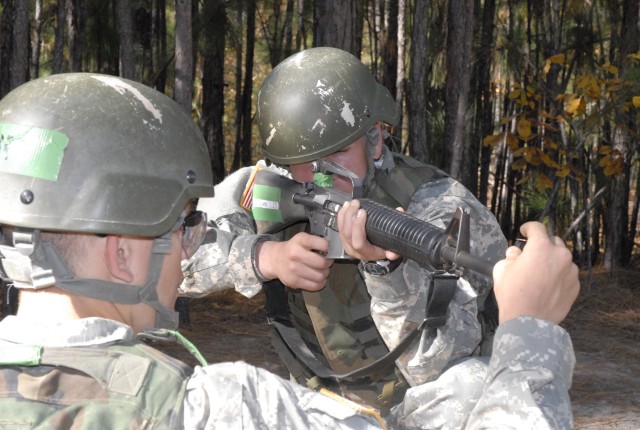The first Fort Jackson battalion to make the switch from nine to 10 weeks of Basic Combat Training is reporting a seamless changeover.
All Army BCT installations officially made the shift to 10 weeks Nov. 2. At Fort Jackson, three companies in 3rd Battalion, 34th Infantry Regiment were the first to make the change.
"The transition to the 10-week BCT has gone smoothly with no major issues," said Lt. Col. Reginald Cotton, commander, 3rd Bn., 34th Inf. Reg. "So far we have seen no real issues."
The U.S. Army Training and Doctrine Command, which oversees BCT, will revert back to the nine-week program for all cycles March 21 to accommodate the anticipated 2008 summer surge. After that, Fort Jackson will conduct 10-week training across the board.
"We have a little more time to spend with them on rifle marksmanship and physical training," said 1st Sgt. Lawrence Coleman, former acting command sergeant major, 3rd Bn., 34th Inf. Reg. "In the past we have had some issues at the end of the cycle with PT and rifle marksmanship and this will allow us to spend more time on those issues."
The increase is the first change in length since 1998, when BCT increased from eight weeks to nine. Despite the additional time, the number of Warrior tasks and battle drills will remain unchanged.
"No new tasks were added for the additional week, which I feel was the right call to make," Cotton said. "It allows for extra time on the range, additional PT and advanced first-aid training."
"The main advantage is that it allows drill sergeants an extra week to concentrate on those tasks that they feel the Soldiers may need some reinforcement training," he said.
Col. Kevin Shwedo, Fort Jackson's deputy commanding officer, said the installation can support the extra week of training added to the calendar.
"It may come at the expense of some of our leadership having to go with back-to-back rotations, or more, because we understand that we are getting ready to put America's sons and daughters in harm's way. We would rather sacrifice some personal time to give them that experience."
Chris.Rasmussen@jackson.army.mil


Social Sharing